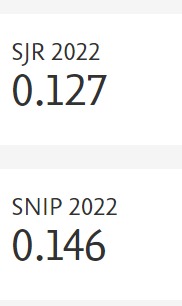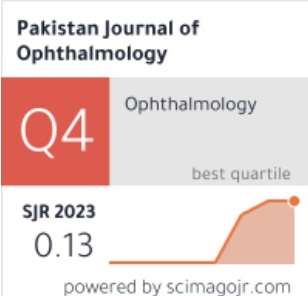Comparison between Suprachoroidal Triamcinolone and Intravitreal Triamcinolone Acetonide in patients of resistant Diabetic Macular Edema
Doi: 10.36351/pjo.v39i1.1480
DOI:
https://doi.org/10.36351/pjo.v39i1.1480Abstract
Purpose: To compare the effectiveness and safety of suprachoroidal versus intravitreal Triamcinolone Acetonide in cases of resistant diabetic macular edema.
Study Design: Quasi experimental study.
Place and Duration of Study: This research was executed at Retina Department of Al-Ibrahim Eye Hospital, Karachi, Pakistan between 1st January 2022 till 30th June 2022.
Methods: Thirty-four patients with resistant diabetic macular edema were selected through convenient sampling and divided equally into two groups. All patients underwent ocular examination. Group I was given single Intravitreal injection (IVI) of 0.1 mL Triamcinolone Acetonide at 4 mg per 0.1 mL concentration. Group II received same dosage of drug via Suprachoroidal injection (SCI). After 24 hours, they were assessed for side effects. After 6 weeks, second dose of same drug was administered. Patients were followed at 3 and 6 months.
Results: No serious side effect was observed in any patient within 24 hours. At 1 month follow-up period, comparison between the two groups for BCVA, CMT and IOP was not significant (p > 0.05). When the two groups were compared at 3 months, both routes were equally effective but IOP remained more stable via SCI route. At 6 months, IOP remained elevated in group I but decreased in group II (p = 0.003).
Conclusion: Triamcinolone Acetonide was effective by both routes in resistant diabetic macular edema in terms of improved BCVA and CMT but SCI was better in terms of IOP and cataract progression.
Downloads
Published
How to Cite
Issue
Section
License
Copyright (c) 2022 Kaleemullah Shaikh, Nasir Ahmed, Umer Kazi, Ali Zia, Muhammad Zunair Aziz

This work is licensed under a Creative Commons Attribution-NonCommercial 4.0 International License.






